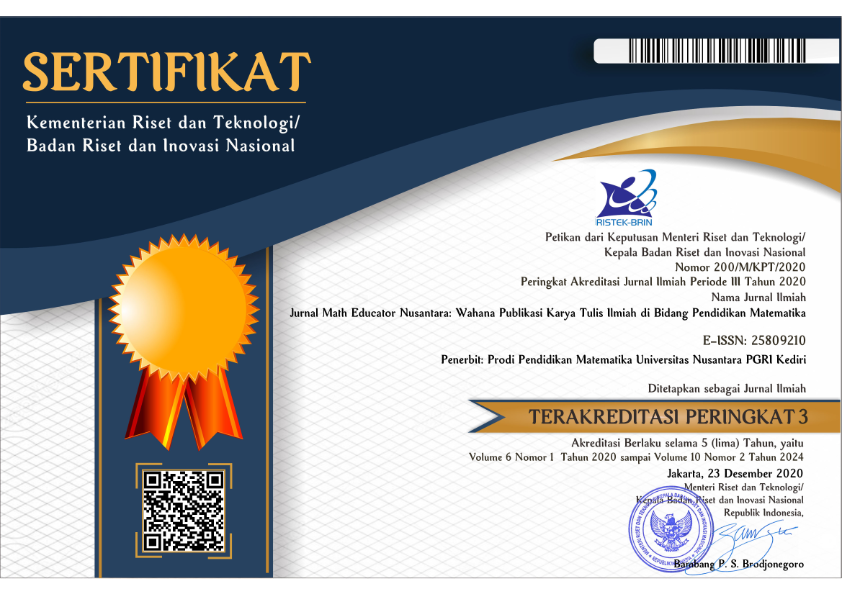Development of PBL-based e-modules to improve problem-solving and critical thinking skills of elementary school students
DOI:
https://doi.org/10.29407/jmen.v10i1.22376Keywords:
E-module, PBL, critical thinking, problem-solving abilitiesAbstract
This research goal is to determine whether there are eligible, practical, and effective problem-based learning e-modules for elementary students. This research was conducted with 5th grade students and teachers in Blitar City, which operates the Kurikulum Merdeka. This study used the ADDIE Model, which entails analyzing a learning need, producing content, developing learning items, putting the product model to the test on participants, and conducting an evaluation. Every stage involves doing observations, interviews, and tests to gather qualitative data for the analysis of any learning requirements. The e-modules product is tested practically using the two types of surveys, ARG and ARS, to determine its eligibility for test quiz skills, problem-solving abilities, and critical thinking. Descriptive analysis and inferential statistics will be used to analyze the data. The study's findings indicate that: (1) Problem-based learning e-modules are matched based on the evaluations of the designers' team and the expertise team. (2) The results of the ARG and ARS tests indicate that problem-based learning e-modules are more practical. (3) The paired sample t-test indicates that problem-based learning e-modules are effective in enhancing problem-solving and critical thinking abilities. There is a significant difference between learning with and without problem-based learning e-modules
References
Abdullah, A.G dan Ridwan, T. (2008). “Implementasi PBL dalam Proses Pembelajaran di BPTP Bandung”. Jurnal Penelitian Pendidikan. 5, (13), 1-10.
Anderson, J. (2009). Mathematics curriculum development and the role of problem solving. In K. School (Ed.), Proceedings of 2009 Australian Curriculum Studies Association National Biennial Conference. Curriculum: A National Conversation (pp. 1-8). Retrieved from http://www.acsa.edu.au/pages/page484.asphttp://www.acsa.edu.au/pages/page484.asp.
Andrews, P., & Xenofontos, C. (2014). Analysing the relationship between the problem-solvingrelated beliefs, competence and teaching of three Cypriot primary teachers. Journal of Mathematics Teacher Education, 18(4), 299–325.
Beyazsacli, M. (2016). Relationship between problem solving skills and academic achievement.
The Anthropologist, 25(3), 288–293.
De Putter-Smits, L. G. A., Taconis, R., & Jochems, W. M. G. (2013). Mapping context-based learning environments: The construction of an instrument. Learning Environments Research, 16(3), 437–462.
Delice, A., & Ergene, O. (2015). Investigation of solving process in integral volume problems within personal relationship; disk, washer and shell methods. Sakarya University Journal of Science, 19: 37-54.
Dori, Y. J., Avargil, S., Kohen, Z., & Saar, L. (2018). Context-based learning and metacognitive prompts for enhancing scientific text comprehension. International Journal of Science Education, 40(10), 1198–1220.
Ennis, Robert H. (2000) "Critical Thinking: An Outline of Goals for a Critical Thinking Curriculum and Its Assessment." Informal Logic 20.
Facione, Peter A. (2015) "Critical Thinking: What It is and Why It Counts." Insight Assessment,
Glazer, E. (2001). Problem based instruction. In M. Orey (Ed.), Emerging perspective on learning, teaching, and technology. Diambil dari http//www.coe.uga.edu/ epltt/ProblemBasedInstruct.htm
Goh, C. (2008). Metacognitive instruction for second language listening development. RELC Journal, 39(2), 188–213.
Johnson, E. B. (2011). Contextual Teaching and Learning Menjadikan Kegiatan Belajar Mengajar Mengasyikkan dan Bermakna. Bandung: MLC
Kilpatrick, J., Swafford, J., & Findell, B. (2001). Adding it up: Helping children learn mathematics. Washington, DC: National Academy Press.
Kramarski, B., Mevarech, Z. R., & Arami, M. (2002). The effects of metacognitive instruction on solving mathematical authentic tasks. Educational Studies in Mathematics, 49(2), 225–250.
Lee, I., & Mak, P. (2018). Metacognition and metacognitive instruction in second language writing classrooms. TESOL Quarterly, 52(4), 1085-1097.
Lee, N. H., Yeo, D. J. S., & Hong, S. E. (2014). A metacognitive-based instruction for primary four students to approach non-routine mathematical word problems. ZDM Mathematics Education, 46(3), 465–480.
Moshirabadi, Z., Haghani, H., & Borimnejad, L. (2016). The perceived problem solving skill of Iranian nursing students: A cross-sectional study. European Psychiatry, 33, 651-652.
NCTM. (2000). Assesment and standards for school mathematics, Reston, VA: Author
Ozcan, Z. Ç. (2015). The relationship between mathematical problem-solving skills and selfregulated learning through homework behaviours, motivation, and metacognition. International Journal of Mathematical Education in Science and Technology, 47(3), 408– 420.
Pilot, A., & Bulte, A. M. W. (2006). Why do you “need to know”? context-based education. International Journal of Science Education, 28(9), 953–956.
Polya, G. (1973). How to solve it. Princeton, NJ: Princeton University Press
Sandi-Urena, S., Cooper, M. M., & Stevens, R. H. (2011). Enhancement of metacognition use and awareness by means of a collaborative treatment. International Journal of Science Education, 33, 323–340
Santia I., & Jatmiko. (2016). Pengembangan modul pembelajaran matematika berdasarkan proses berpikir relasional dalam upaya meningkatkan kemampuan menyelesaikan masalah aljabar siswa SMP. Jurnal Math Educator Nusantara, 2(1), 11-18
Szabo, A., & Andrews, P. (2017). Uncovering the relationship between mathematical ability and problem solving performance of Swedish upper secondary school students. Scandinavian Journal of Educational Research, 62(4), 555–569.
Ultay, E. (2017). Examination of context-based problem-solving abilities of pre-service physics teachers. Journal of Baltic Science Education, 16(1), 113-122.
Westbroek, H. B. (2005). Characteristics of meaningful chemistry education, the case of water quality. Unpublished doctoral dissertation, The Netherlands: Utrecht University, Utrecht.
Yu, K.-C., Fan, S.-C., & Lin, K.-Y. (2014). Enhancing students’ problem-solving skills through context-based learning. International Journal of Science and Mathematics Education, 13(6), 1377–1401.
Yu, K.-C., Fan, S.-C., & Lin, K.-Y. (2014). Enhancing students’ problem-solving skills through context-based learning. International Journal of Science and Mathematics Education, 13(6), 1377–1401.
Downloads
Published
Issue
Section
License
Authors who publish with this journal agree to the following terms:
- Copyright on any article is retained by the author(s).
- The author grants the journal, the right of first publication with the work simultaneously licensed under a Creative Commons Attribution License that allows others to share the work with an acknowledgment of the work’s authorship and initial publication in this journal.
- Authors are able to enter into separate, additional contractual arrangements for the non-exclusive distribution of the journal’s published version of the work (e.g., post it to an institutional repository or publish it in a book), with an acknowledgment of its initial publication in this journal.
- Authors are permitted and encouraged to post their work online (e.g., in institutional repositories or on their website) prior to and during the submission process, as it can lead to productive exchanges, as well as earlier and greater citation of published work.
- The article and any associated published material is distributed under the Creative Commons Attribution-ShareAlike 4.0 International License













